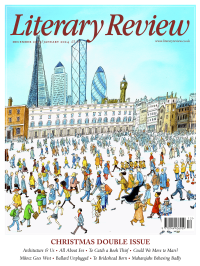Joel Kotkin
Home Truths
Property: The Myth That Built the World
By Rowan Moore
Faber & Faber 336pp £14.99
For most of human history, from the ancient Semitic civilisations to the societies of the present, property has played a central role in exciting both achievement and destruction. In examining its role in our past and present lives, Rowan Moore’s new book offers many insights. Moore, architecture critic at The Observer, appreciates the role that property has played in advancing civilisation, as well as in many horrific episodes, from the near-extermination of native peoples to the development of chattel slavery. He does a credible job of describing how John Locke’s defence of private property drove Britain’s Industrial Revolution, as well as helping to shape both the colonisation of North America and the US Constitution, with its protection of individual property rights. He rightly catalogues the abuses of aboriginal peoples and the confiscation of their terroirs that stemmed from the growth of natural-law ideas of property.
When Moore turns to the present, however, his analysis begins to lose a sense of perspective. He considers the very idea that property ownership is a natural right a fundamentally harmful ‘myth’ – a function of power rather than wisdom. It might benefit the individual but, in Moore’s view, it hurts society overall. Although he understands that markets form one component of a successful economy, he believes that our approach to property should be more ‘social’. He even finds room to praise the feudal system, where lords and peasants knew their rights and obligations. He ignores the failures of socialist attempts at city-making, the principles of which were set out in the 1971 book The Ideal Communist City, written by a committee of architects and urban planners from the University of Moscow and widely distributed in the West. Many of the values espoused by that book’s authors – for example, distaste for single-family homes, backyards and private cars – match precisely the values of new urbanists like Moore. A visit to the former socialist ‘paradises’ that surround Moscow, Prague and Budapest should be enough to demonstrate the limitations of ‘social’ planning. Moore also fails to identify the role that governments and planners in the West have played in dividing cities ever more deeply along class lines. In the United States and the United Kingdom, studies have found, strict regulations on suburban development and their consequence, higher urban population densities, are associated not with lower property prices but with less affordable housing.
This is really the key crisis facing property markets, and society in general. The French economist Thomas Piketty has identified property as a central factor in the widening of inequality around the world in recent decades. In the United States between 2010 and 2020, the proportion of real-estate wealth

Sign Up to our newsletter
Receive free articles, highlights from the archive, news, details of prizes, and much more.@Lit_Review
Follow Literary Review on Twitter
Twitter Feed
Under its longest-serving editor, Graydon Carter, Vanity Fair was that rare thing – a New York society magazine that published serious journalism.
@PeterPeteryork looks at what Carter got right.
Peter York - Deluxe Editions
Peter York: Deluxe Editions - When the Going Was Good: An Editor’s Adventures During the Last Golden Age of Magazines by Graydon Carter
literaryreview.co.uk
Henry James returned to America in 1904 with three objectives: to see his brother William, to deliver a series of lectures on Balzac, and to gather material for a pair of books about modern America.
Peter Rose follows James out west.
Peter Rose - The Restless Analyst
Peter Rose: The Restless Analyst - Henry James Comes Home: Rediscovering America in the Gilded Age by Peter Brooks...
literaryreview.co.uk
Vladimir Putin served his apprenticeship in the KGB toward the end of the Cold War, a period during which Western societies were infiltrated by so-called 'illegals'.
Piers Brendon examines how the culture of Soviet spycraft shaped his thinking.
Piers Brendon - Tinker, Tailor, Sleeper, Troll
Piers Brendon: Tinker, Tailor, Sleeper, Troll - The Illegals: Russia’s Most Audacious Spies and the Plot to Infiltrate the West by Shaun Walker
literaryreview.co.uk